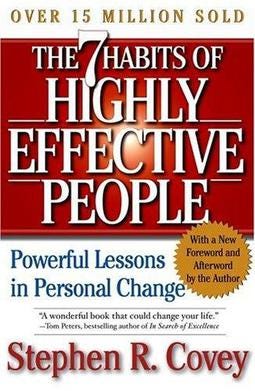Effects of Lose-Win Negotiations on Children in Immigrant Households (#47) 🤺
Sidewalk Gum and Shaken Pop Bottles, Which One Are You?
Six Archetypes for Human Integration
In his era-defining opus The 7 Habits of Highly Effective People, Stephen Covey explores how principle-driven living can drive the results we seek in our professional and personal lives. His 4th Habit is “Think Win-Win”, which is about rethinking how we try to enjoy the fruits of cooperation using the systems and language of competition in our professional and personal lives, and what steps we can take to realign our methods and goals.
In this section, Covey presents us with archetypes through which to understand all kinds of human interactions. These archetypes are more philosophies that motivate our behaviour when approaching interactions. It’s a frame of mind that fuels our intentions.
The names for the archetypes mirror typical negotiation language, and that’s because at the core of interaction is two forces jostling to reach an agreement. Below, I will list and describe the “paradigms”, as Covey calls them, and then dig deeper into the one I find fascinating.
Win-Win—“It’s not your way or my way, it’s the better way.” Conclusions are mutually beneficial and equally exciting for all parties. The underlying principle is an abundance mindset; there is enough for everybody.
Win-Lose—“If I win, you lose.” In the family context, children internalize Win-Lose paradigms when love is given on a conditional basis and they are frequently compared to other children. Academically, normalizing grades against a distribution makes it statistically impossible for all students to do well so helping other students is disincentivized.
Lose-Lose—“If I go down, you’re coming down with me.” This is the philosophy of revenge. It’s assumed everyone will lose, so might as well make the loss spectacular.
Lose-Win—“I just want you to be happy.” People who operate from this archetype are generally people-pleasers with little courage (or freedom) to express their needs and wants. They bury these unexpressed feelings and grow resentful over time. Alternatively, they may feel compelled to make a concession to aid a guilty conscience.
Win—“I’m looking after myself.” These people don’t carry a sense of competition. They’re unconcerned what happens with everyone else as long as their needs are met. They are not interested in investing in the relationship nor tearing it apart. They are indifferent.
Win-Win or No Deal— “If we don’t find something we both love, there’s no need to settle.” This liberates us from manipulating others or pushing our own agenda. Synergy is the priority, and if all parties aren’t benefiting, we are agreeing to walk away rather than sour the relationship.
While reading Covey’s description of Lose-Win dynamics, I couldn’t help but draw a parallel between it and another dynamic: being a child in an immigrant household. Let’s explore.
Lose-Win Negotiations in Immigrant Households
In many immigrant households, kids learn from an early age that decisions are made unilaterally by the chief decision-makers of the household: the parents. In some households, disagreement, even discussion, is not tolerated. Approaching an interaction with a questioning attitude could signal dissent and inspire a defensiveness in the parents that conditions the child against disagreement. In other words, what the parents say goes, full stop.
Of course, during early childhood, before a child has any concept of safety or what’s good for them, parental oversight and unilateral direction is required. But once a child reaches the early ages of maturity and begins forming their own thoughts and opinions, they may develop needs and preferences their parents may have trouble understanding. Equipped with cultural scripts that indisputably place parents at the distant top of the household hierarchy, immigrant parents may not feel a need to pause and reflect on their child’s requests and worse, may reprimand their child for being “difficult”, “ungrateful”, or “different”.
Over the years, the child’s desires are forced to be suppressed, their own goals and ideas cast aside, so they can work to manifest their parent’s ideals. Through repeated stifling, the child is taught to ignore their own needs and wants and replace their internal imaginative, curious dialogue with their parents’ voices dictating what’s best. They silence their natural inclination and go along with their parents because it leads to less tension at home. That wilful concession-giving to “keep the peace” is quintessentially Lose-Win.
Consequences: The Sidewalk Gum and the Shaken Pop Bottle
There are generally two developmental paths children take when they come from a household where parents are uncompromising in their “I know what’s best for you and I will not hear any different” stance, even as they grow into adolescence. Children either become Sidewalk Gum or Shaken Pop Bottles.
Sidewalk Gum
These down-trodden children have been instilled with a complete lack of confidence in themselves and their opinions because they have never enjoyed non-confrontational agreement at home. They tend to continue into adulthood with severe self-esteem issues and struggle with trusting themselves to decide even menial things. Without direction or an explicit path for how to proceed, these kids are utterly paralyzed.
Their parents have stepped on them and cast away their originality and individuality so much they no longer respect their own individuality themselves. Who other people are and what they have will always seem more valuable. A deep sense of “I’m nobody” may be all-pervasive, loud enough to overpower strong senses of self-worth but perhaps too quiet to be elevated to conscious thought.
Later into adulthood, Sidewalk Gum struggle to think independently and largely depend on their parents or other authority for guidance, support, and affirmation. They latch onto the sense of security their parents provide and never entirely grow out of that infantilization.
Shaken Pop Bottles
These combustible children quietly obey their parents’ wishes at home and then intentionally defy them the first opportunity they get. Each opinion suppressed for the parents’ benefit builds frustration and resentment until they explode, lashing out and doing all they can to escape their parents’ oppressive grasp.
These children may grow so determined to unshackle themselves from their parents’ oppressive oversight that desperation may supersede logic and reason. They may engage in reckless behaviour with the sole purpose of trying to cram as much novel experience in as little amount of time as possible, while they are out from under their parents’ thumbs. There may also be this general attitude of making up for lost time.
A main differentiation between Sidewalk Gum and Shaken Pop Bottle children is the former self-perpetuates the conditioning initiated by the parents whereas the latter seek any and every opportunity outside the watchful eye of their parents to resist that same conditioning. In the absence of their parents, Sidewalk Gum children continue to behave as though their parents are walking alongside them in lockstep, judging each and every thought and action they have. Shaken Pop Bottle children have internalized that their parents are not privy to that which they are not around to witness and behave accordingly, often as two extremely different people around their family and away from them.
Sidewalk Gum are so used to the Lose-Win dynamic they begin to see themselves as losers, incapable of providing long-lasting value. Shaken Pop Bottles, on the other hand, are so tired of losing in the Lose-Win dynamic that they will exploit any opportunity they can to feel like they’re winning. Sometimes, that means distancing themselves from their parents to minimize the parental influence and judgment. Ultimately, in both outcomes, Lose-Win morphs into Lose-Lose For All.
Catharsis
There’s a catharsis in being listened to and believed without challenge or needing to justify oneself. Reliably being met with resistance when voicing any idea, even for inconsequential things, denies a child that release. Obliging a child’s preference unless it has some material downside affirms their sense of self and builds their confidence over time so they can be self-directed and independent practitioners in the world as adults.
Perpetual Lose-Win interactions between children and their parents as a staple of their home life has severe ramifications for their self-concept and confidence. They will be groomed to feel down-trodden and dependent on others’ guidance, or on the other extreme, will be led to be rebellious and reckless when given the opportunity to make decisions for themselves.
A great tactic to figure out where someone falls on this spectrum if they grew up in a household that denied much freedom to express individuality through choice is to think about how they behaved when they were left to their own devices during post-secondary education. Even more instructive if they needed to move away from home to go to school. Did they disappear inside themselves, seemingly afraid of new people and new experiences? Were they always on the go, seemingly desperate for novelty and “fun” to the point of self-destruction?
Where do you fit on this spectrum, if at all?
Covey stresses that in most contexts, especially between friends and family, Win-Win or No Deal is the ideal. Of course, “No Deal” isn’t really an option between parents and children, and a give-and-take that may result in some Lose-Win compromises are inevitable. Children, can, however, understand their parents’ motivations and make Win-Win decisions which give parents what they’re looking for while also satisfying the child’s need for affirmation and confidence.
It’s tough, but as thinking adults, we must recognize whether we are doing something because our parents never let us do it before, or whether it’s something truly in our best interest. It takes extreme self-awareness and maturity to be able to differentiate between the two. The best we can hope for is that we have the good sense to jostle justly once it’s our turn to negotiate with our kids.
Happy winner,
Vandan🏡
@vandan_jhaveri






